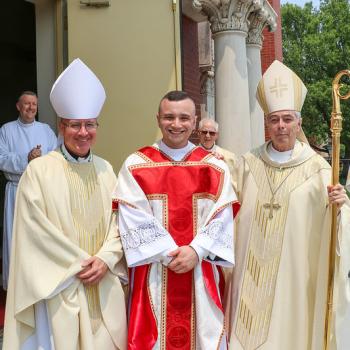On the surface, the question "Which is the greatest commandment?" doesn't seem like much of a test. But the question about which of the 613 commandments in the Law was the greatest was hotly debated at the time. Some held that they were equally important; others that a gradation was needed in practical application in daily life. (Meier 157)
Jesus' answer juxtaposes Deuteronomy 6:5, the great Jewish prayer, the Shema, withLeviticus 19:18. An addition to Mark's version comes in verse 40: "On these two commandments hang all the law and the prophets." With this statement, Matthew's Jesus recapitulates his teaching ministry. The mention of the "law and the prophets" takes us back to 5:17-20, where Jesus introduces the purpose of his teaching ministry as "to fulfill the law and the prophets." It takes us back to the Sermon on the Mount (7:12), where Jesus teaches "the Golden Rule," followed by "this is the law and the prophets."
In giving this answer to the Pharisees' controversial question, "What is the greatest commandment?" this passage is not seeking to prove that these two commandments have never been juxtaposed before. The apocryphal book, The Testament of the Twelve Patriarchs, makes frequent pairings of love of God and compassion for neighbor.The sage Hillel, an elder contemporary of Jesus, is credited with formulating a negative form of the Golden Rule when asked to sum up the entire Torah concisely to a gentile who wished to become a Jew.
Matthew's Jesus in this passage is seeking to prove two things:
a) He is underscoring his identity as a God-authorized interpreter of tradition.
b) He is countering a notion that that love of God and love of neighbor are two parallel but separate spheres of human responsibility. Rather, they are mutually interdependent loves. To love God is to love the neighbor. To love the neighbor is to love God. Sabbath laws do not take precedence over human needs. Because to love God is to love the neighbor, we are even empowered to love our enemies.
Douglas Hare points out that "In an age when the word 'love' is greatly abused, it is important to remember that the primary component of biblical love is not affection, but commitment."
He continues, "Warm feelings of gratitude may fill our consciousness as we consider all that God has done for us. But Deuteronomy 6:5 is not talking about warm feelings but stubborn, unwavering commitment. To love the neighbor (including our enemies) does not mean to feel affection for them, but to imitate God in taking their needs seriously." (Hare 260)
Pop Quiz for Us
Jesus, having answered the Greatest Commandment question, seizes the initiative and becomes the test giver (22:41-45). He addresses a theological question to the Pharisees with their nationalistic hope of a future Davidic Messiah. He asks whose son the Messiah is supposed to be. They answer "David's." Jesus then asks why David, under the inspiration of the Holy Spirit, addressed the Messiah as Lord when he wrote Psalm 110:1. If David uses such a title of respect and distance for this Messiah, how could the Messiah be simply David's son?
The passages ends on an ominous note. "No one was able to give him an answer, nor from that day did anyone dare to ask him any more questions."
When dialogue stops, relationship is over. In this story, when dialogue with the teacher ends, plans for his death begin.
For us, these temple disputes can be the beginning rather than the ending. The beginning of a time of testing if we continue to walk with this teacher.
How will we do on his test? Matthew 25:1-26:13 shows us what will be on it. Will we keep our light burning (ten bridesmaids, Mt. 25:1-13)? Will we invest our talents (25:14-30)? Will we feed the hungry, clothe the naked, visit the imprisoned (25:31-46)? Will we anoint Jesus with devotion and loyalty (26:6-13) or be satisfied with criticizing others' efforts? In short, will we love our neighbor in loving God and will we love God in loving our neighbor?
It's much harder to take a test than it is to give one, isn't it?
Sources Consulted
Douglas R. A. Hare, Matthew: Interpretation, A Bible Commentary for Teaching and Preaching
John P. Meier, The Vision of Matthew: Christ, Church and Morality in the First Gospel





